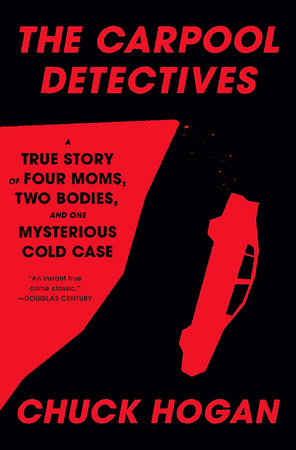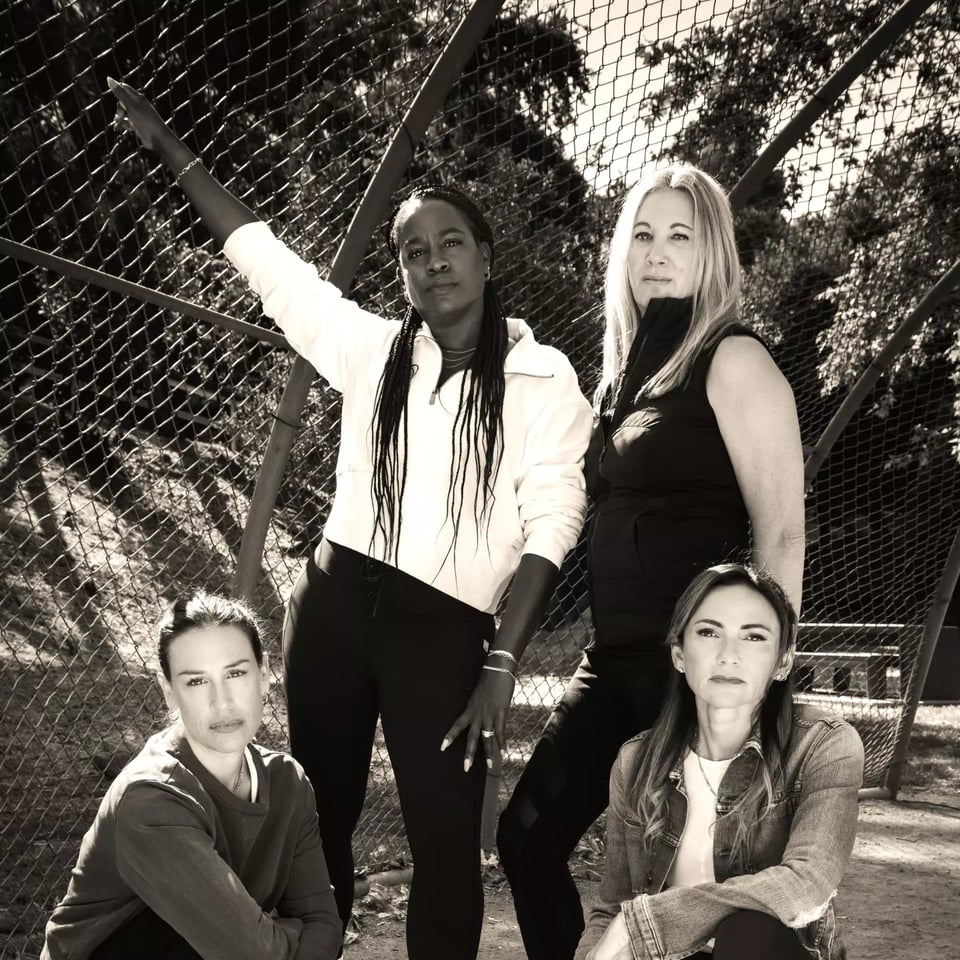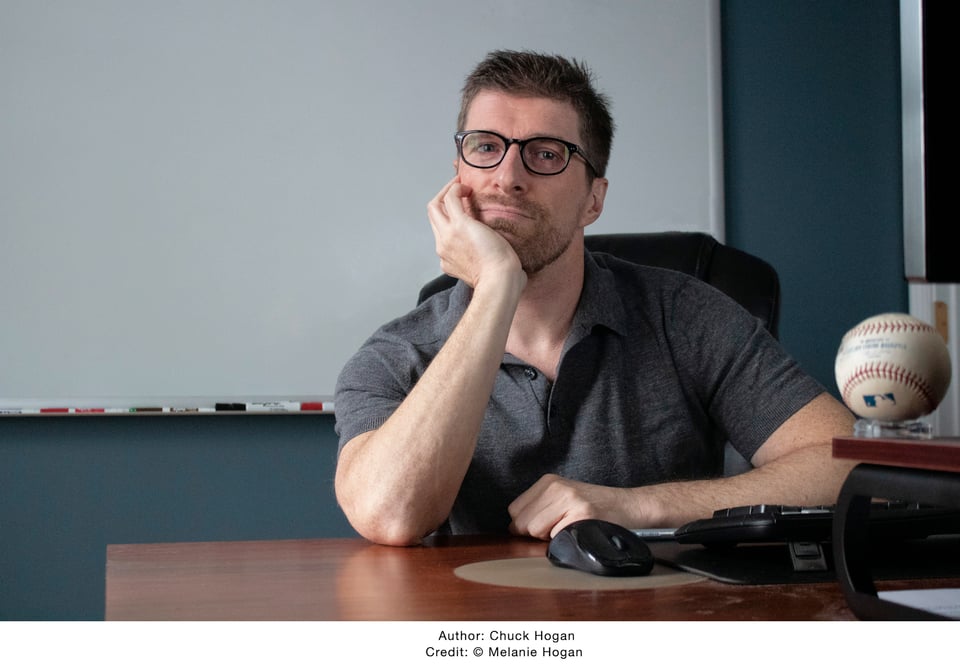The Crime Lady: A Few Questions for Chuck Hogan

Dear TCL Readers:
Chuck Hogan has been a mainstay of crime and thriller fiction for three decades, debuting with The Standoff (1995) and making a more recent, excellent impression with Gangland (2022), a juicy mid-century Chicagoland tale that I loved, even as his career has veered into some unexpected, years-long directions (The Strain trilogy, and subsequent TV series, he co-authored with Guillermo del Toro, with whom he’s still working with today.)
But the novel most readers likely associate Hogan with is Prince of Thieves (2004), a propulsive heist narrative that was extremely Boston — the gang plans to rob Fenway Park as their biggest score, after all — and the source material for the extremely entertaining 2010 film The Town. It’s also about teamwork and friendship and betrayal and internal conflicts, themes that play out in perhaps Hogan’s most surprising project yet.
When I first learned of The Carpool Detectives, out this week, I got very excited — Chuck Hogan traveling to the nonfiction side of the aisle? A story of four California moms, looking for an outlet for their existential frustrations, banding together to solve a murder and actually succeeding?
This was a wild story, and I ripped through the book in a single rush. I also knew I had to find out about how and why Hogan embarked on this particular story and what he took away from the experience of getting inside the heads of Marissa, Jeannie, Samira, and Nicole, the amateur crime-solving foursome.
The following Q&A, conducted earlier this month, is lightly edited and condensed for clarity:
The Crime Lady: First off, this is your first nonfiction book (that I know of!) Did you always know this story had to be told as fact and not as fiction? And how did this story land in your lap?
Chuck Hogan: In April 2023, I was at the Edgar Allan Poe Awards, wearing a tuxedo, chatting with my agent during the pre-banquet cocktail hour, and he related this story he'd been told about four moms who solved a double homicide cold case during Covid. It was maybe a sixty-second summation but this was clearly a remarkable and unique story. He said they'd met with a few non-fiction authors but there were serious issues with the actual case that could expose the four women to danger if the exact crime was detailed in print. So serious, in fact, that, at that time, two of the women weren't sure they wanted to participate at all - so shaken were they by what they had discovered. I never had any inclination or interest in writing true crime or any kind of non-fiction, but I offhandedly suggested that he try to get someone like me, a crime novelist, to tell the women's investigative side of the story while obscuring the actual facts of the crime itself.
I met with Marissa, Jeannie, Samira, and Nicole via Zoom and they were (and are) very impressive, and I began to see this as less a "true crime" book than a kind of procedural memoir. The Carpool Detectives is about the investigators as much as it is about the crime itself and the investigation. It was clear to me that they had achieved something remarkable, and clear to me how they did it - but not clear why they did it. That pulled me in. Maybe I was looking for a new challenge. We sold it at auction and suddenly I was writing non-fiction.
TCL: Moving over to crime nonfiction means landing square in the middle of the True Crime Industrial Complex, and particularly with this story, of four women, previously unknown to one another, who join forces to try solving a murder. What were some of the deeper questions you wanted to grapple with in this story, and how did your sources help you do this, directly or just in terms of how they conducted their investigation?
CH: No one book is going to get its arms around the entirety of the current True Crime phenomenon. But here was the true story of four women without any law enforcement experience whatsoever who were driven to investigate the murders of two people they'd never met, who blew past every STOP sign and DANGER - DO NOT PASS sign along their way to solving it, and who weren't Instagramming their adventure or doing this for likes or clicks, operating completely under the radar.
Four women who had left professional careers for motherhood (Nicole was still working), and now found their children approaching an age of independence, leaving the women wondering what would come next. By working tirelessly to find answers for another family's mystery, they were also searching for answers in theirs and their families' lives.

TCL: The Carpool Detectives gives almost everyone involved the story a pseudonym, which wasn't that unusual, and the moms are only referred to by their first names (though they have since gone more public.) What was unusual is that the murder victims are also pseudonymous, and details of the crimes have been changed. I'm curious about navigating this, both in terms of giving people the privacy they needed but also corroborating the details so that we, as readers, know that what we are reading is 100 percent factual.
CH: Well, that was the job. I knew that going in. It was a great responsibility, actually, and I have no qualms about it. The account of what the women achieved and how they achieved it is complete. I had access to all their research, their contemporaneous texts and notes, and of course their own recollections. A footnote on page four makes my approach clear, and the afterword elaborates on process and intent.
By book's end, the reader will understand that the resolution of this double homicide exposed a broader conspiracy with potentially very dangerous ramifications. And the women were clear from the start that they had made a promise to the victims' daughter that her and her family's privacy would be protected.

TCL: Did working on The Carpool Detectives change your own relationship with true crime, and also with the expectations of the mystery & thriller genre?
CH: It didn't, not at all. What was interesting and challenging for me was to write without a true authorial voice, to not intrude upon the women's stories and to let the investigation tell itself. The audiobook is, fittingly, going to be narrated by a woman (TCL: Gabra Zackman, one of the best in the business, who narrated SCOUNDREL and I’LL BE GONE IN THE DARK), and while normally I can't bear to listen to my writing in any other voice, I will give this one a try.
TCL: Because the quartet met in 2020, the pandemic is a real character in this book in a way that was somehow surprising and yet wholly inevitable. How much of an impact did Covid have on this story, and could it have happened in the same way in a different (particularly a pre-Covid) time frame?
CH: No one wants to return to those dark days, but Covid played a huge part in their investigation. It gave them access to experts - detectives, lawyers, accident reconstruction professionals, etc. - who might not otherwise have had time for questions from amateur sleuths. Lockdown gave them a chance to go a little crazy - as we all did - but also to take stock at this critical juncture of their lives. We make the point at the end of the book that they likely would have found a way through to the next phase of their lives regardless, but the great "pause" of Covid allowed for their almost total transformation.
TCL: Without giving it away, The Carpool Detectives ends in a way that is narratively satisfying even as it may not be satisfying from an "achieving justice" standpoint. How do you feel about where the story ended up, and what it means for Marisa, Jeannie, Samira and Nicole?
CH: I think it's quite profound, actually. To me, their story is the perfect mix of wish fulfillment - four rank amateurs dig into an unsolved crime, earn the trust of the victims' daughter, develop theories that win over the police, and emerge as a bona fide detective team - and be careful what you wish for - not wanting to spoil anything, I'll just say the words "Witness Protection." They wanted justice but their ultimate goal was always to provide answers for the victims' daughter, who regarded them as her last hope.
TCL: Lastly, are you heading back into fiction territory with your next book, or is nonfiction something you'd like to write more of?
CH: One and done for me - itch scratched. It was a great privilege to tell this amazing story, but I've got stories of my own to tell, and not enough time to tell them all.
**
Until next time, I remain,
The Crime Lady